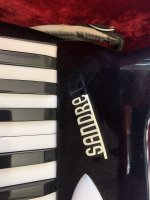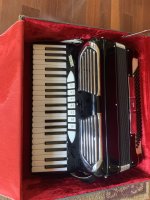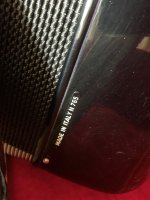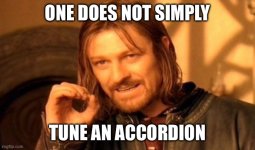You are using an out of date browser. It may not display this or other websites correctly.
You should upgrade or use an alternative browser.
You should upgrade or use an alternative browser.
New old accordion
- Thread starter LBG
- Start date
isorry123
Member
For an LMH, could be worth up to $800.
I say “up to” because it’s more likely to need new wax and leathers, and a good cleaning. If it just needs wax and leathers I would pay $300. Bellows look pretty good, body and keys look good.
People always try to sell these things for top dollar because they’re comparing it to a listing on reverb or liberty bellows - not knowing that those instruments have had work done on them to make them worth what they are.
If it’s fallen apart internally it will be worth far less. Had a friends accordion come and it was missing three bass reeds, like what’s he going to do with no root G, Am, or Em
I say “up to” because it’s more likely to need new wax and leathers, and a good cleaning. If it just needs wax and leathers I would pay $300. Bellows look pretty good, body and keys look good.
People always try to sell these things for top dollar because they’re comparing it to a listing on reverb or liberty bellows - not knowing that those instruments have had work done on them to make them worth what they are.
If it’s fallen apart internally it will be worth far less. Had a friends accordion come and it was missing three bass reeds, like what’s he going to do with no root G, Am, or Em
Do all reeds work properly and are in tune? does it smell musty? Is compression tight? What length does the keyboard measure? Value depends on a lot of conditional factors. It looks like it was a solid intermediate level instrument when it was new. Might be worth taking to a legit accordion shop for a health check and an appraisal.
What does LMH stand for?For an LMH, could be worth up to $800.
I say “up to” because it’s more likely to need new wax and leathers, and a good cleaning. If it just needs wax and leathers I would pay $300. Bellows look pretty good, body and keys look good.
People always try to sell these things for top dollar because they’re comparing it to a listing on reverb or liberty bellows - not knowing that those instruments have had work done on them to make them worth what they are.
If it’s fallen apart internally it will be worth far less. Had a friends accordion come and it was missing three bass reeds, like what’s he going to do with no root G, Am, or Em
Also do you know of a place where I could take this to get a tune up or at least evaluated? I would like to keep and learn how to play it. Thanks.
LMH references an accordion with 3 reed sets on the treble side with 3 different octaves. It stands for low, middle, high. It also looks like the accordion has a mute chamber toggle. Many players like to have at least two sets of middle reed sets to allow one set to be detuned for a tremolo effect that is used for a lot of ethnic music. An LMH instrument will always be dry tuned.
I believe your closest shop is Carnegie accordions in Carnegie PA. But Liberty Bellows in Philadelphia would be another option.
I believe your closest shop is Carnegie accordions in Carnegie PA. But Liberty Bellows in Philadelphia would be another option.
Thank you! Already found the Carnegie shop and plan on taking it there. Lots to learn.LMH references an accordion with 3 reed sets on the treble side with 3 different octaves. It stands for low, middle, high. It also looks like the accordion has a mute chamber toggle. Many players like to have at least two sets of middle reed sets to allow one set to be detuned for a tremolo effect that is used for a lot of ethnic music. An LMH instrument will always be dry tuned.
I believe your closest shop is Carnegie accordions in Carnegie PA. But Liberty Bellows in Philadelphia would be another option.
Dingo40
Been here for ages!
Hi LGB and welcome!What does LMH stand for?
LMH stands for Low, Medium and High, meaning the accordion has three sets of treble reeds (or voices): sounding in a low register, a middle register and a high register.
So, each set sounds an octave higher than the one below it and corresponds (tonally) to wind organ pipes of 16 ft, 8 ft and 4 ft in length.
Don't sweat on it too much, you'll soon get the hang of it, if you intend to learn to play!
This also relates to prices, as used accordions (currently) are selling at around $250 per voice (there being accordions with two, three, four and even five voices), with additional price adjustments for age, condition and special features (hand made reeds) or issues (tuning, leather valves, damage, brittle wax or mould).
Also, some sellers provide a warranty of perhaps 3 or 6 months duration and, naturally, charge more because of it.
Last edited:
The problem with a "tune up", if it actually involves tuning an instrument, tends to be that it is ridiculously expensive considering the estimated value of an older instrument that is not particularly fancy. Tuning involves destructively modifying the reeds by scratching them, with the location of the scratching depending on whether you need to take the note up or down. Every note in every reed group has two reeds (one for push, one for pull), so for this instrument we are talking 3*41*2 reeds that need tuning in the treble and 4*12*2 reeds in the bass (assuming a typical 4-reed bass) that all need to get made to sound correct. There is no point in doing so before establishing that the reed plates are still tightly (and airtightly) fixed to the reed blocks, filling and pallets do not have any leakage, and all the valves are in good shape.Also do you know of a place where I could take this to get a tune up or at least evaluated? I would like to keep and learn how to play it. Thanks.
So you'd just want a basic checkup that figures out larger problems and advice of whether the instrument is in a shape where you start practising on it. Any decisions involving non-trivial amounts of money should be postponed until you have a handle on what you want end up doing with which instrument.
You may well be in luck and the instrument will be fine for getting up to speed. It is quite unlikely that it is fit for recording pieces or playing in an ensemble, but it may even work well enough for singing along or busking. If you have someone look it over and possibly fix the worst problems on the spot, you may want to factor in something to leave in the tip jar.
isorry123
Member
Dingo40
Been here for ages!
I though we were trying to recruit more players to the accordion?The problem with a "tune up", if it actually involves tuning an instrument,
Vladimir M.
Active member
Why would he/she do that? Asking online members of a specialized forum seems to people to be a faster and more convenient way to solve such a problem...Might be worth taking to a legit accordion shop for a health check and an appraisal.
I fully agree.It looks like it was a solid intermediate level instrument when it was new.
Best regards,
Vladimir
I think the OP can learn some critical facts from this thread.Why would he/she do that? Asking online members of a specialized forum seems to people to be a faster and more convenient way to solve such a problem...
I fully agree.
Best regards,
Vladimir
1) value and usability of this instrument will be dependent on the condition the instrument has been left in. That improper storage can ruin instruments that look ok from the outside.
2)evaluation of its condition is best accomplished by someone that knows these instruments and can get hands on to put it through the paces. They may also be able to identify feature sets or reed quality that would make this a nicer or more valuable instrument.
3) repairs may be needed to get this back to working condition that may cost more than purchasing a similar instrument already in working condition. It also may not need any significant repairs.
4) not wishing to start a controversial discussion but if it’s as indicated by the register switches (I’ve had accordions that had reed sets that didn’t match the indicated registers) and is in fact LMH, it might not be well suited to certain types of music so the OP may need to confider whether or not this is the “right” instrument for them to invest in if repairs estimates exceed a certain value. An LMH can be great for serious study of the accordion, but it won’t do some of the sounds typically associated with the accordion.
5) on the same theme accordions are built in different sizes which may make an instrument more or less appropriately scaled to a specific player. Generally a full size instrument has a 41 note keyboard of 19”, which is my preferred size. I can play a 17” keyboard a bit uncomfortably but not really any smaller.
A three-star restaurant can be great for serious study of dining, but it won't teach some of the sounds typically associated with food-ingesting humans. It's not like the burger joint next door is inaccessible or expensive if you are overcome by some more basic urge occasionally.An LMH can be great for serious study of the accordion, but it won’t do some of the sounds typically associated with the accordion.
Similar threads
- Replies
- 11
- Views
- 127




